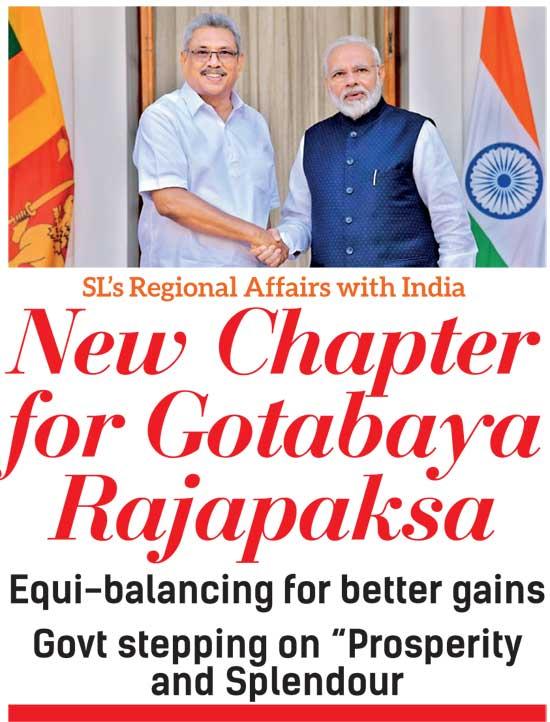Reply To:
Name - Reply Comment
Sri Lanka, is an island in the strategic positioning of the Indian Ocean is continued a vital player for spectators watching the concert of the Indian Ocean. The world has become quite  observatory about Sri Lanka’s political leadership change after November 2019 making a direction for stable and prosperous foreign affairs.
observatory about Sri Lanka’s political leadership change after November 2019 making a direction for stable and prosperous foreign affairs.
Domestically, people were indubitable that Gotabaya Rajapaksa’s (GR) campaign resulting in victory. The peoples’ choices have detoured for the best leadership due to one prominent reason; which is none other than the collapse of public trust during the previous political regime.
These fateful circumstances witnessed by Sri Lankans made the choice by making President Rajapaksa win with a 52% voting base.
We need to understand the physical and psychological state of mind of people who are engaging formally and informally with the government. The people showed the need of a government change, its structure and policy to lift the country from its decline evident in many spheres. They are such as economic failure in the GDP annual growth rate declining from 5% in 2015 to 3.7% in 2019 mid-year according to Central Bank reports in November 2019, the military and intelligence failures due to state negligence gave rise to public disappointment after the disastrous Easter Sunday Attacks in April 2019 killing more than 300 people and resulted in massive economic loss.
The failures in the corruption-free strategy with the Central Bank-bond scandal reported the largest public sector funds mismanagement under the United National Front (UNF) government and their failure to provide accountable action in investigations, and unavailing political promises of making Sri Lanka a better country. Also, some of the most crucial goals under the state reconciliation project which gradually industrialized to different personal favours deter its healthy application of people benefiting from reconciliation. When closely examining Northern and Eastern provinces, they are still the lowest contributors to GDP growth. The unemployment prevails high in these provinces and they reported as least performing in economic sectoral development according to the latest reports of the Economic Outlook of Sri Lanka. One of the striking challenges in economy is in the large industries: Tourism, trade and services sector development. The investors and entrepreneurs have insisted about the urgency of political stability, which was not obvious during the trembling relations between the UNP and SLFP leadership mixer.
According to Dr. Chulanee Attanayake from the Institute of South Asian Studies of the National University of Singapore, the international community has misread the reasons for GR’s victory, and they continue to misinterpret his policies.
For instance, the weight given for the Easter Bombing as the primary cause of his victory is a misinterpretation. Anti-incumbency sentiments of the public were first shown during the Local Government elections in 2018. Easter attack only provided a booster for GR’s campaign. Similarly, the international communities’ reading on Sri Lanka’s future foreign policy is flawed. Taking note of former President Mahinda Rajapaksa’s government’s relationship with China, President GR’s foreign policy also mispredicted. What this analysis fails to notice is that the time and situations have changed.
During MR regime, Sri Lanka had very little choice in gaining support from multiple countries for its development drive. Alleging on war crimes and human rights issues the West and its traditional partners alienated Sri Lanka. China was the only country which came forward. Looking at how the regional and international politics have changed over the years, it is clear that every country is ready to reach out to Sri Lanka equally.
India stays as the leading neighbourhood state and the ties run from pre-colonial history to current date. One who examines India-Sri Lanka relations should look at the trade partnership that India extended from 2012 being the biggest trader before China entering in 2015. According to Dr. Attanayake, GR’s acceptance of invitation to visit India as its first state visit proves how he is breaking the pro-China formulation. The Manifesto of GR has emphasized that democratic governance and friendly, non-aligned foreign policy strategy would be the starting point of a new state affairs.

I have spelled out in the recently published book ‘Foreign Policy Perspectives in 2020,’ about the need of small state diplomacy: where peaceful means as an ideal strategic departure for Sri Lanka’s foreign relations. This would not be so easy to Sri Lanka with time to time changing foreign policy behaviours.
This is a question beyond ordinary debate. Most importantly, Sri Lanka should examine to what extent it has concerned “national interest” which should be unique and vital explicating one’s foreign affairs. The capacity of using “national interest” in the platform of “open-diplomacy” where foreign engagements are both promoting and proactive: Sri Lanka emphasizes the “non-interference” added to the new strategy.
Many successful international cases show, the success of small state diplomacy is working for status quo to enhance cooperation and responsible behaviours in which all the above concepts are incorporated.Therefore, in the possibilities opening, President GR is in the stand of extending the willingness to build trust, multilateralism where friendly nations are invited to cooperate and attempt to re-brand the nation by highlighting its national potentials such as economic growth and sustainable well-being.
At this strategic juncture when Sri Lanka is facing rigorous impacts from Indian Ocean politics, the country should not hesitant to cooperate with India’s interest in the Indian Ocean for several vital reasons. I may highlight three primary developments. The South Asian region has tensed with the involvement of US Indo-Pacific strategy, Chinese investment footprints and the battering of West-East transport corridor where many other states are also finding the opportunity for venturing. Sri Lanka is directly meeting these three main developments as both prospects and challenges.
"The President have shown a great interest of renegotiating some of the primary partnership agreements where China stays in the top of the list"
Also, domestic is keen about changing regional affairs. Various domestic audiences are keen to know Sri Lanka’s future with SOFA, ACSA and (most debated) MCC offerings from USA. Some massive loans have been taken from China, therefore what would be the standpoint of Sri Lanka in the paying back along maintaining future ties. The recent views of President GR have shown a great interest of renegotiating some of the primary partnership agreements where China stays in the top of the list. The new President has considered “equi-balancing” diplomatic affairs as the direction for confidence-building Sri Lanka’s position in the Indian Ocean engagements.
The President has already extended invitations to international investors from Singapore, Japan,Australia, India and China to be benefiting from investor-friendly foreign policy opening. This type of venturing would be extremely tough unless prioritizing of the “national interest” at certain costs. On the other hand, it would be costlier for a small state to let go cooperating deals. In this context the direction of “equi-balancing” would be both supportive and strategic at great deal in order to safeguard core national interests of Sri Lanka while benefiting from emerging economic and political revivals.
Can India’s neighbour’s friendly relations view an ideal choice? For few reasons, I may say yes. Indo-Lanka relationships are mutually beneficial due to common goals. President GR declares “civilizational relations nurtured through millennia” during his visit to India. In addition, President GR seems transforming challenges to opportunities when holding hands with India’s neighbourhood First policy by recognizing the important role of Sri Lanka through historical well-being of two states, their cultural affirmation and trade partnership. On the other hand, some of the very recent events between Sri Lanka and India have shown leader-to-leader cordial rapprochement positioning actor-driven ties: Indian Prime Minister visited Sri Lanka twice within three years and the Indian PM’s second-term’s first state visit to Sri Lanka was a solidarity gesture showing collective security stand-point to support Sri Lanka’s external security affairs.
Also, India is watchful and proactive, and was the first state to wish well about the new President’s win even before the Election Commission Sri Lanka finished declaring the election results. As to some experts, Modi’s leadership style has inculcated its foreign policy for fostering rich neighborhood relations.
The democratic pathways of Gotabaya Rajapaksa seem constructive and hopeful for citizens of the country. If PM Modi’s style is acculturating India’s foreign policy can GR’s style would act the same in Sri Lanka’s foreign policy? During the past one week under his presidency, we experienced changes of political culture: making changes from national affairs to grassroots affairs: Such as drastic cut downs of officers working for his private security in the expectation of saving public money, tax reductions, and other purposeful implementations like removing of pictures of the President, Prime Ministers and Ministers from the government offices and instead replacing them with the state logo. The establishment of Environment Police to tight with “green city” concept and making some of the development projects that were halted for many years immediately put into action such as central expressway and Ratnapura Expressway: Many more unstated here.
With these quick and drastic (I would say) changes of political leadership in the internal affairs of Sri Lanka, it is obvious that the foreign policy will be also on a move towards eager changes. The President GR has declared future ties between the two countries and Sri Lanka’s foreign policy interests on mutual grounds during his first official visit to India. As an academic, with some ground work about his present actions, I project my assumption on President GR’s visionary leadership qualities towards firm bilateral relations. Which is an essential shift in the process of strategizing and investing on neighbours first endeavour.
Author is a Lecturer, at the Department of International Relations, University of Colombo, Sri Lanka. She is a free-lance writer and the ideas expressed in the article are solely independent.